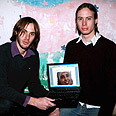
Decade later, Sbarro attack still haunts victims
'Israeli society has repressed attack, but in my family death is inseparable part of life,' says orphan who lost five family members
Shvuel Schijveschuurder would not recognize the junction of King George and Jaffa streets in Jerusalem – the scene of the Sbarro terror attack, which claimed the lives of 15 people and injured 132 during the height of the 2001 al-Aqsa intifada.
The Sbarro restaurant is gone, in its place a coffee shop and even a light train rail. But on the 10-year anniversary of the awful attack, Schijveschuurder says he is still haunted by the images of that day.
- Receive Ynetnews updates directly to your desktop
Schijveschuurder was just 17 when a suicide bomber wearing a vest filled with nails waged one of the deadliest terror attacks in Israeli history, killing his parents – Mordechai and Tzira – and three of his brothers and sisters – Hemda, Yitzhak, and Raya.
"I am still in a battle of survival and a battle of the soul, and I don't need anniversaries to remember," Shvuel told Ynet. "It accompanies me all the time. I am like a wounded animal. There was no choice but to go on living, but I am always tight as a spring. There is no calm or quiet. I am also very sad that in the end, the one who did this is a human. God is not responsible for good and evil, it is humans' choice."
To residents of Jerusalem passing through the junction, the attack is a faraway memory best set aside in hopes of better times. "We're not afraid," they said.

Scene of attack, ten years later (Photo: Gil Yohanan)
Recently the Schijveschuurder orphans - Shvuel and his four remaining siblings - received hope in the form of a new law providing orphans whose parents were killed in terror attacks with a lifelong stipend. But Shvuel still feels Israel has largely forgotten them.
"Israeli society is suffering from national post-trauma, so it prefers to repress this," he explained. "But in our family death is an inseparable part of life."
Schijveschuurder thinks society should be doing more to commemorate victims rather than trying to "repress" the 2001 events, mentioning the 'alternative' ceremonies for Palestinian victims that took place in Tel Aviv during this year's Remembrance Day.
'Don't release a single prisoner'
He has also been hearing the name of Abdallah Barghouti, the Hamas terrorist who planned the attack, mentioned as one of the prisoners who may go free in a prisoner exchange for kidnapped soldier Gilad Shalit.
"We must not return a single Palestinian prisoner sentenced to life in prison in Israel, because it endangers IDF troops and can lead to another Gilad Shalit. I want to see Gilad return home just like everybody else, but this is an issue that troubles me greatly," Schijveschuurder explained.

Plaque commemorating 15 terror victims (Photo: Gil Yohanan)
Shira Cohen, who was buying pizza with her friends on that fateful day as a 15-year old girl, is still suffering from effects of the wounds she contracted – bone fractures in her hands and legs and shrapnel wounds throughout her body.
"Every year is a sort of victory. During the days of rehabilitation, when I couldn’t walk, my dream was to fast forward a few years and see everything go back to normal," she said. Today Shira is a married mother of one who lives with her family in the south.
"Ten years later, I feel that I have chosen to return to life and won some normalcy back. For years, I repressed the fear that is created from the feeling that your life can be over in a second and that it can happen again."
She disagrees with Schijveschuurder, saying that she believes Israeli society has undergone a positive process. "I have a feeling that the time of terror attacks was repressed in Israeli society's collective memory because it is hard to deal with such fear. Maybe this is actually a healthy choice – a choice to go on living," she explained.
- Follow Ynetnews on Facebook










